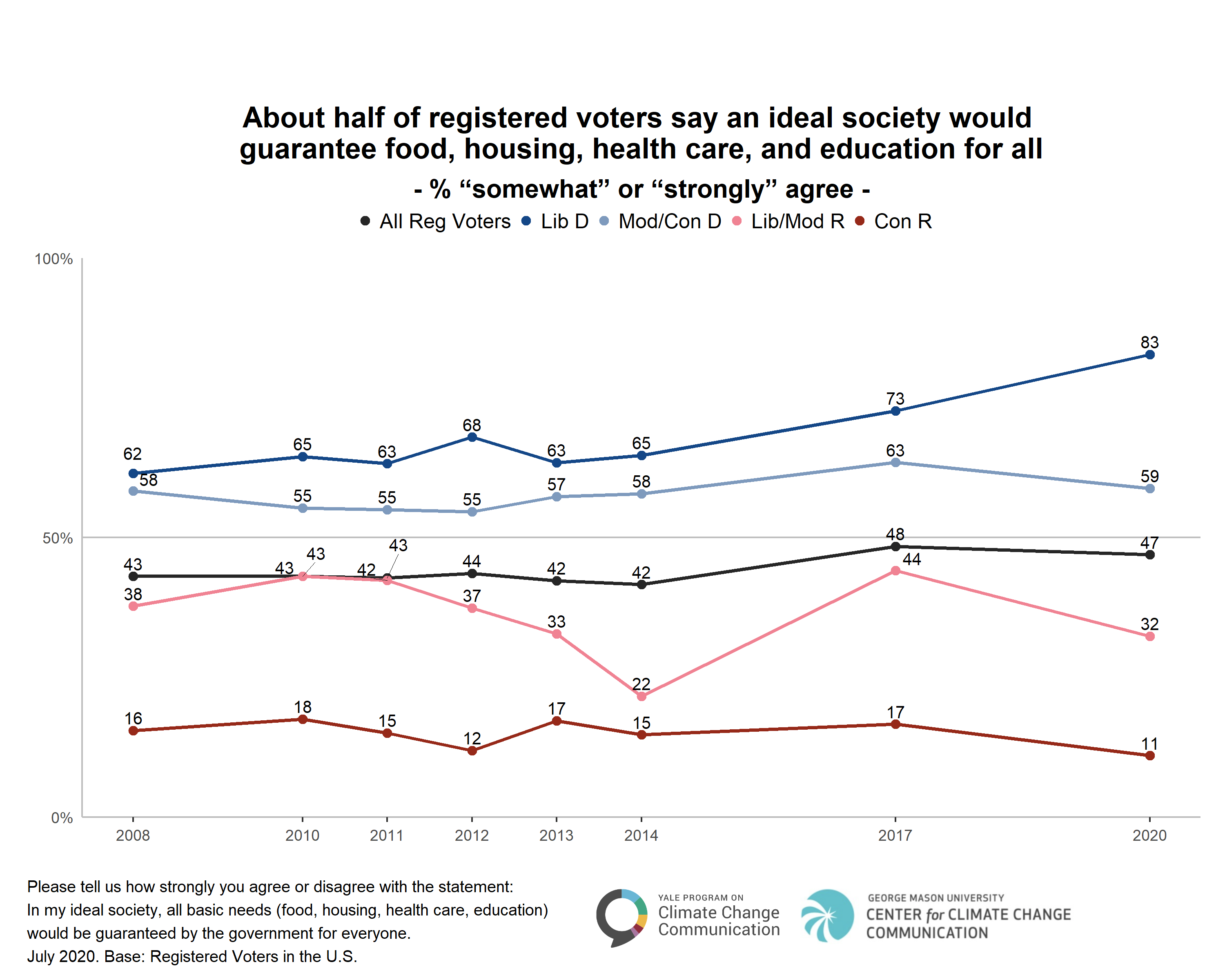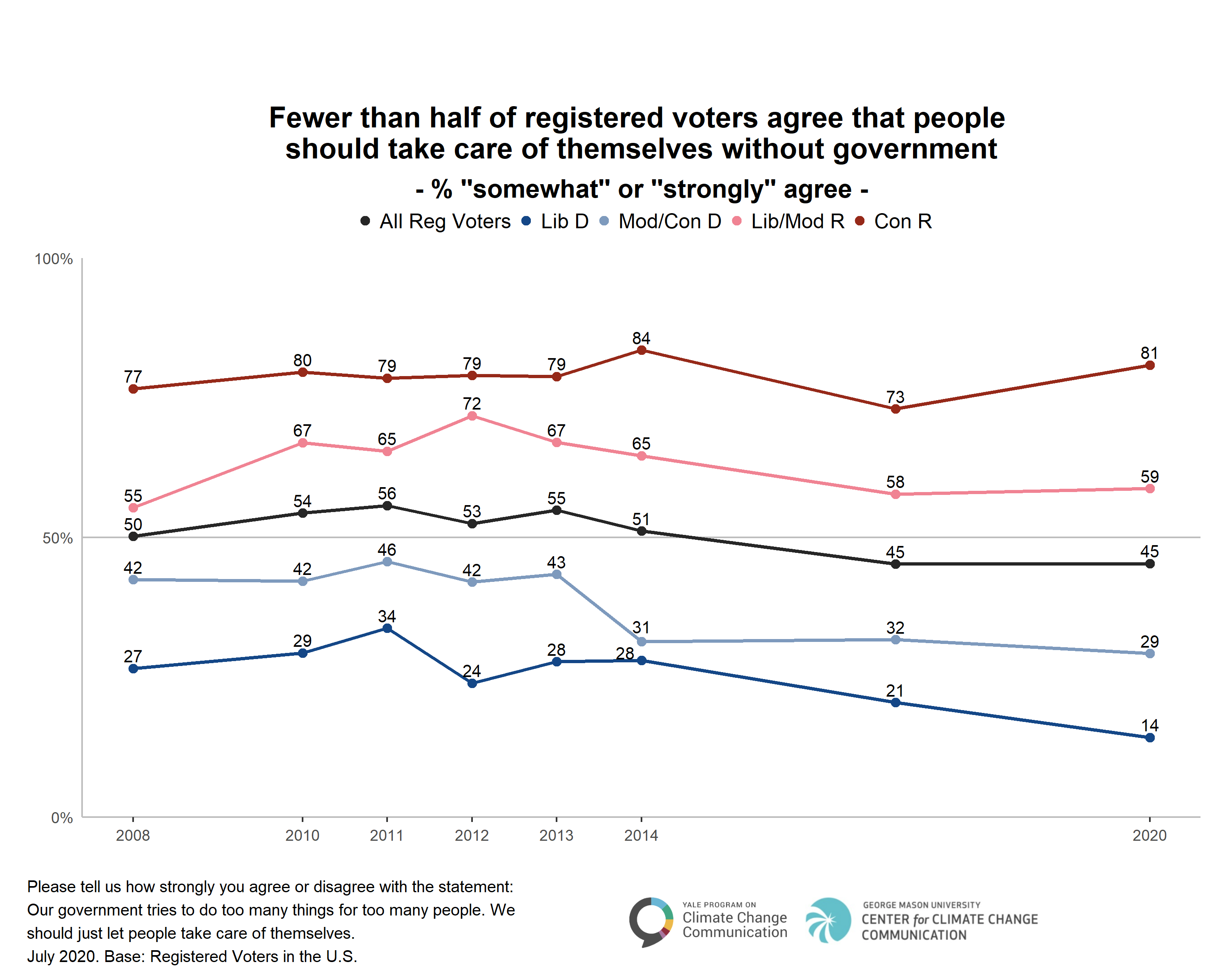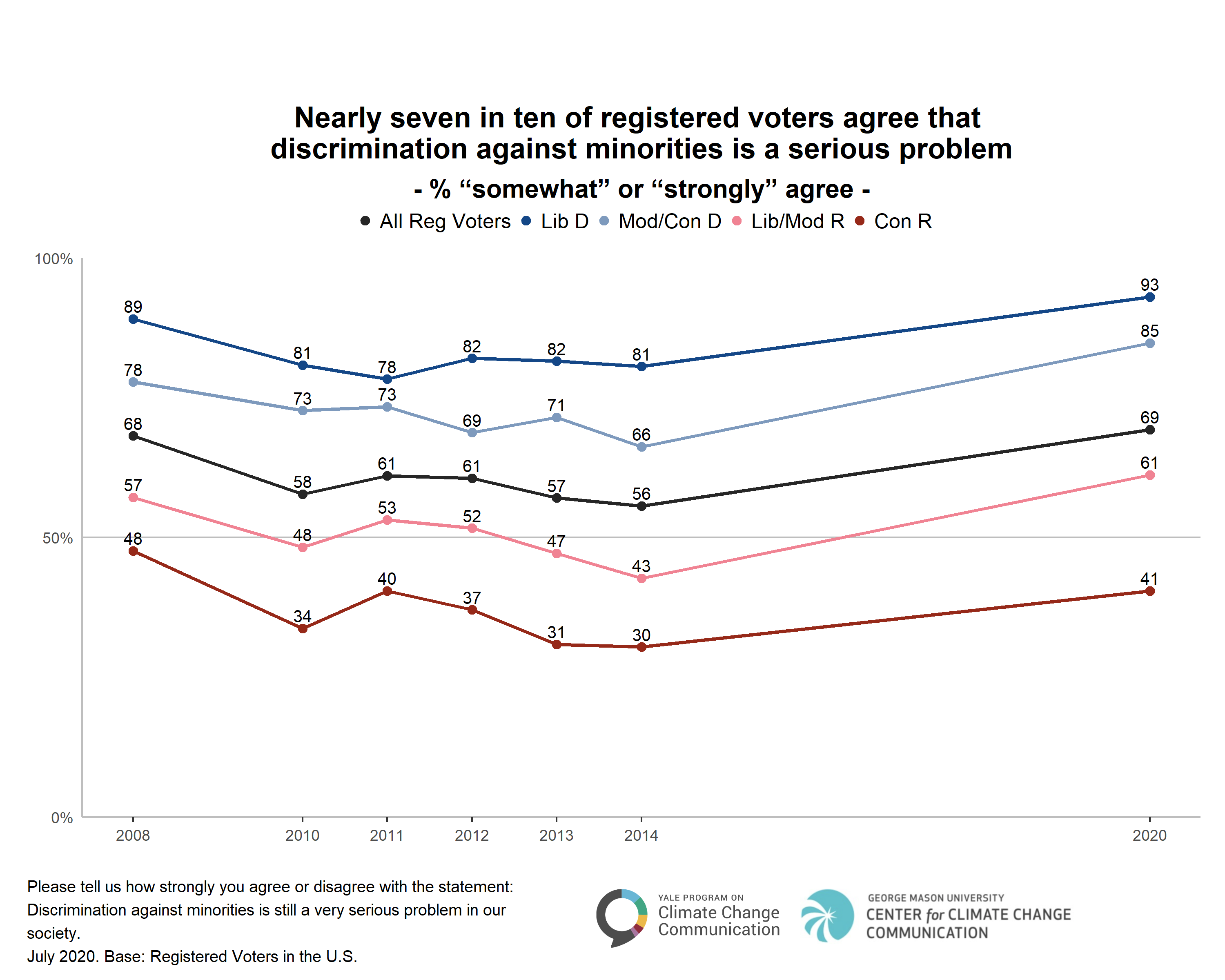Climate Note · Nov 11, 2020
Shifting views of an ideal society in the U.S.
By Jennifer Carman, Seth Rosenthal, Edward Maibach, John Kotcher, Xinran Wang, Jennifer Marlon and Anthony Leiserowitz
Filed under: Beliefs & Attitudes and Policy & Politics

Individuals’ attitudes toward climate change risks and solutions are shaped by personal and social factors other than knowledge of climate change alone (van der Linden, 2015). One such factor is differing cultural worldviews, or values regarding how society should be structured and the role of government in addressing problems (e.g., Douglas, 1966; Leiserowitz, A., 2006; van der Linden, 2015).
Two important types of cultural worldviews are egalitarianism and individualism. People with a more egalitarian worldview tend to believe that society should promote equality, social justice, participatory democracy, and diversity, and are generally more concerned about environmental hazards including climate change (Leiserowitz, 2006). They also tend to favor government actions to solve societal problems, including increased environmental regulations. In contrast, people with a more individualistic worldview are more likely to believe that society should promote individual liberty, autonomy, and opportunity (Leiserowitz, 2006). They tend to be less concerned about environmental hazards and favor greater freedom for industry. As a result, they generally oppose government intervention and environmental regulations.
Our Climate Change in the American Mind surveys have repeatedly included questions over the past 12 years that measure these worldviews among the American public. Here we report on how several key measures of these worldviews have changed among registered voters over time.
Democrats and Republicans tend to have very different cultural worldviews: Democrats tend to be more egalitarian, while Republicans tend to be more individualistic. Our data suggests that Democrats — particularly liberal Democrats — have become more egalitarian and less individualistic since 2008, whereas Republicans have remained highly individualistic.
Liberal Democrats increasingly say all basic needs (food, housing, health care, education) should ideally be guaranteed by the government for everyone. In 2020, about half of registered voters (47%) say that in an ideal society, the government would guarantee all basic human needs (including food, housing, health care, and education) for everyone. Strikingly, about eight in 10 liberal Democrats (83%) and about six in 10 moderate/conservative Democrats (59%) agreed with this statement in 2020. By contrast, only about three in 10 liberal/moderate Republicans (32%) and one in 10 conservative Republicans (11%) agree with this vision of an ideal society. From 2008 to 2020, liberal Democrats’ support for this statement increased by 21 percentage points, while moderate/conservative Democrats’ support remained essentially unchanged (+1 percentage point). Conversely, support for this statement decreased by 6 points among liberal/moderate Republicans and by 5 points among conservative Republicans.
Democrats increasingly say the world would be more peaceful if wealth were divided more equally among nations. In 2020, nearly half of registered voters (46%) say the world would be a more peaceful place if its wealth were divided more equally among nations. Majorities of liberal Democrats (72%) and moderate/conservative Democrats (66%) held this view, but only about three in ten liberal/moderate Republicans (31%) and fewer than two in 10 conservative Republicans (16%) held this view. From 2008 to 2020, support for this statement increased by 12 points among liberal Democrats and by 18 points among moderate/conservative Democrats. In contrast, support among liberal/moderate Republicans decreased by 12 points from 2008 to 2020, and among conservative Republicans it remained relatively low and steady throughout.
Democrats increasingly disagree that the government should spend less time trying to fix people’s problems. In 2020, half of registered voters (50%) say that if the government spent less time trying to fix everyone’s problems, we’d all be a lot better off. Republicans were particularly likely to support this statement, including eight in 10 conservative Republicans (80%) and about two in three liberal/moderate Republicans (65%). Support was much lower among Democrats, including 37% of moderate/conservative Democrats and about one in five liberal Democrats (22%). Moreover, support for this statement among registered voters overall has decreased significantly since 2008. However, this change has largely been driven by Democrats, who have become much less likely to support this statement, with agreement falling by 21 points among both liberal Democrats and moderate/conservative Democrats. Support among Republicans, however, did not change much over the 12-year period (liberal/moderate Republicans -4 percentage points, conservative Republicans -2 percentage points).
Democrats increasingly disagree that the government tries to do too many things for too many people, and we should just let people take care of themselves. Eight in 10 conservative Republicans (81%), and about six in ten liberal/moderate Republicans (59%), say our government tries to do too many things for too many people, and we should just let people take care of themselves. In contrast, only three in 10 moderate/conservative Democrats (29%) and half that many liberal Democrats (14%) agree. Since 2008, agreement among both liberal Democrats and moderate/conservative Democrats decreased by 13 points, while agreement among both conservative Republicans and liberal/moderate Republicans increased by 4 points.
Nearly seven in ten registered voters (69%) say that discrimination against minorities is a serious problem. In 2020, large majorities of liberal Democrats (93%) and moderate/conservative Democrats (85%), and six in 10 liberal/moderate Republicans (61%) say that discrimination against minorities is still a very serious problem in our society. In contrast, only four in 10 conservative Republicans (41%) agree with this statement. Overall, voters’ level of agreement with this statement in 2020 is similar to 2008, but has increased significantly since 2014 after an initial drop in 2010, during the early years of the Obama presidency.
Democrats and Republicans tend to have very different cultural worldviews about the ideal structure of society and the role of government. Democrats tend to be more egalitarian than individualistic, while the opposite is true for Republicans. Moreover, over the past 12 years, Democrats’ have become more egalitarian and less individualistic, whereas Republicans’ worldviews have remained mostly static. The shift among Democrats has led to increasing support for strong government action to solve societal problems, from health care to climate change. Therefore, building a bipartisan consensus on climate change may be becoming more difficult, as the two parties increasingly have divergent views of the role of government in solving problems like climate change.
Methods:
The data included in this report are based on data from 10 waves (n = 10,436 registered voters) of the bi-annual Climate Change in the American Mind survey — a nationally-representative analysis of public opinion on climate change in the United States conducted by the Yale Program on Climate Change Communication and the George Mason University Center for Climate Change Communication. Surveys were conducted from Fall 2008 to June 2017 using the Ipsos (formerly GfK) KnowledgePanel®, a representative online panel of U.S. adults (18+). Data for July 2020 (n = 803 registered voters) were also collected separately by Yale and George Mason University using the Ipsos KnowledgePanel® omnibus survey. Datapoints for 2011, 2012, and 2013 report the average of results from two waves of data collected in each of those years. All questionnaires were self-administered by respondents in a web-based environment.
The average margin of error for each wave of data is +/- 3 percentage points at the 95% confidence level. Percentage values are weighted to align with U.S. Census parameters. For tabulation purposes, percentage points are rounded to the nearest whole number.
References:
Douglas, M. (1966). Purity and danger: An analysis of concepts of pollution and taboo. London and New York: Routledge & Keagan Paul.
Van der Linden, S. (2015). The social-psychological determinants of climate change risk perceptions: Towards a comprehensive model. Journal of Environmental Psychology, 41. 112-124. https://doi.org/10.1016/j.jenvp.2014.11.012
Leiserowitz, A. (2006). Climate Change Risk Perception and Policy Preferences: The Role of Affect, Imagery, and Values. Climatic Change, 77, 45–72. https://doi.org/10.1007/s10584-006-9059-9




